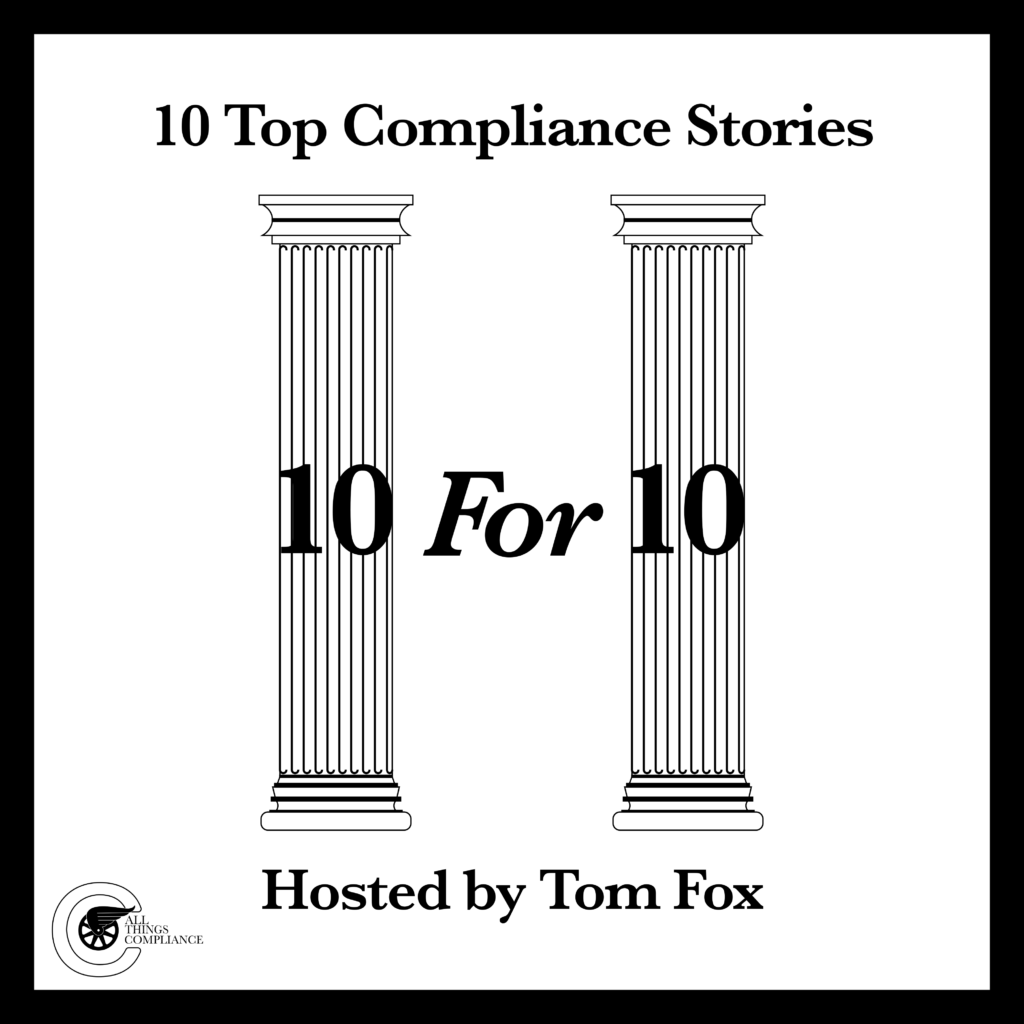Last week, representatives of the US government announced one of the largest sets of fines and penalties for failures in anti-money laundering ever laid down. It involved TD Bank N.A. and TD Bank US Holding Company. It was over $3 billion in fines and penalties with a restriction in growth until the company gets its compliance act together. However, it is not the fine nor creative penalty that flags this matter but the underlying facts and raw brazen-ness of the 10th largest bank in the United States to either actively engage in an ongoing criminal enterprise or to willfully disregard specific evidence of criminal activity and failure of basic compliance which makes this enforcement action stand out. Employees from the front-line tellers who took in millions of dollars in cash, right up to the Board of Directors, knew the bank’s conduct was illegal or buried their collective heads so far down into the sand that they could have caused the China Syndrome to self-execute.
The regulators and enforcers in this sordid tale include the Department of Justice (DOJ), the Board of Governors of the Federal Reserve Board (FRB), the Treasury Department’s Office of the Comptroller of the Currency (OCC), and Financial Crimes Enforcement Network (FinCEN). According to a DOJ Press Release, TD Bank N.A. (TDBNA) and its parent company TD Bank US Holding Company (TDBUSH) (together with TDBNA, the Bank) pled guilty today. They agreed to pay over $1.8 billion in penalties to resolve the Department of Justice’s (DOJ) investigation into violations of the Bank Secrecy Act (BSA) and money laundering. Finally, TD Bank’s guilty pleas are part of a coordinated resolution with the FRB, the OCC, and FinCEN. With the additional fines and penalties due to these entities, the total fine and penalty is over $3 billion.
TDBNA pled guilty to conspiring to fail to maintain an anti-money laundering (AML) program that complies with the BSA, failing to file accurate Currency Transaction Reports (CTRs), and money laundering. TDBUSH pleaded guilty to causing TDBNA to fail to maintain an AML program that complies with the BSA and to fail to file accurate CTRs.
To add to all the above, the government put a restriction on TD’s growth until it fully remediates its compliance program because, as noted by Matt Kelly in Radical Compliance, it specified that “TDBNA’s total assets cannot exceed $434 billion without OCC approval, and that approval will not come until TDBNA completes an extensive transformation of its AML compliance program.” Further, Kelly noted that if “TDBNA does not make progress on those compliance program reforms in a timely manner, OCC can reduce that asset cap by another 7 percent, and keep going until TD gets its compliance act together. In other words, the longer TD drags its feet on implementing compliance reforms, the tighter the leash around its neck will get.”
How did the Bank get to this point, what can it do to resolve this mess, and what are the lessons learned for the compliance professional, corporate executive, and Board of Directors? Additionally, what is the point of punishment? Will foreign entities always come to the US, open branches, and engage in illegal activities, all in the scramble for the all-mighty dollar? Will corporate executives ever be held liable for intentionally looking the other way or burying their heads in the sand? Several blog posts will explore the answers to these questions and more.
What They Said-Merrick Garland
In a rare appearance by Attorney General Merrick Garland to announce the guilty plea, fine, and penalty, he stated, “Today, TD Bank pled guilty to multiple felonies, including conspiring to violate the Bank Secrecy Act and commit money laundering. TD Bank has also agreed to a $1.8 billion criminal penalty. Combined with civil enforcement actions announced today by other agencies, the United States will impose a total [penalty] of approximately $3 billion against TD Bank. TD Bank created an environment that allowed financial crime to flourish. By making its services convenient for criminals, it became one.
Today, TD Bank became the largest bank in U.S. history to plead guilty to Bank Secrecy Act program failures and the first U.S. bank to plead guilty to conspiracy to commit money laundering. This is also the largest-ever penalty under the Bank Secrecy Act and the first time the Justice Department has assessed a daily fine against a bank. As part of the plea agreement, TD Bank will fundamentally restructure its corporate compliance program at its U.S.-based bank, the 10th largest in the United States. The bank has also agreed to impose a three-year monitorship and a five-year term of probation. While the bank has started its remediation, it will continue to remediate and improve its anti-money laundering compliance program to ensure that it operates lawfully and safely.”
What They Said-Lisa Argentieri
Deputy Assistant Attorney General Nicole M. Argentieri said, “Over the course of a decade, TD Bank placed profits over compliance, prioritizing a “flat cost paradigm” that limited spending across the bank — including on the bank’s anti-money laundering (AML) compliance program, despite growing risks — even while profits soared. The bank knew it had pervasive and systemic deficiencies in its AML program, including a transaction monitoring system that remained stagnant over 10 years despite warnings from regulators, consultants, and even its employees. AML employees joked that the Bank’s failed AML system made TD an “easy target” and a “convenient” bank for bad actors. And they were right. TD’s failed AML compliance program created vulnerabilities that criminals — including TD’s employees — used to launder money through the Bank. All told, three large money laundering networks, two prosecuted by our partners in the District of New Jersey and the third prosecuted in the District of Puerto Rico, laundered over $670 million through TD.
Notably, the Bank did not self-disclose any regulator. Yet after the Bank was notified of the investigation into its conduct, “the Bank provided strong cooperation. For example, TD identified additional misconduct and provided evidence of that misconduct to the department. Some of that evidence helped advance our investigation of individuals, including video surveillance footage TD provided after reviewing hundreds of hours of videotape and materials recovered because TD secured the workplaces of employees involved in misconduct.”
Additionally, and becoming increasingly standard in such resolutions, the culpable entities are engaged in clawbacks. Argentieri noted that the Bank “took steps on its own to hold its employees financially accountable. The Bank clawed back bonuses, including for its CEO and other executives, resulting in a dollar-for-dollar reduction of the Bank’s fine of approximately $2 million.” Yet she emphasized that the Bank’s “resolution marks a first. This is the first time a company has committed to clawing back compensation prospectively. Over the next few months, TD will identify additional compensation it will claw back from its employees. And if the bank is successful during the term of its agreement with the department, the Criminal Division will credit those clawbacks against the fine.”
I will explore this matter in some depth over the next several blog posts. Tomorrow, I will consider how profits over compliance led to disaster.
Resources
OCC
OCC Press Release
DOJ
TD Bank US Holding Company Information
TD Bank US Holding Company Plea Agreement and Attachments












